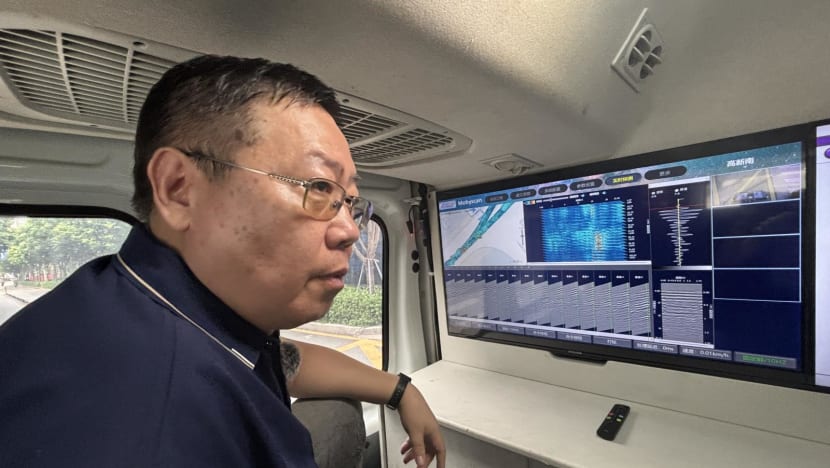World
Singapore Firm Launches Innovative Radar Technology to Detect Sinkholes

A Singaporean company, DECOD Science & Technology, is piloting an advanced radar technology in Shenzhen aimed at detecting potential sinkholes before they pose a threat. The system, akin to a CT scan for infrastructure, utilizes ground-penetrating radar (GPR) to identify underground anomalies including voids and unstable soil layers. This initiative comes in response to a worrying trend of sinkhole incidents across Asia, which have resulted in infrastructure damage and loss of life.
DECOD, founded in Singapore in 2003 with support from the Economic Development Board, has rapidly established itself as a leader in GPR technology in China. According to state media, Zhi Haiyan, the company’s founder, is recognized as a prominent figure in this field. A graduate of Tsinghua University, Zhi has extensive experience in GPR research and development, particularly in China’s aerospace sector. After becoming a Singapore citizen in 2011, he launched a joint venture in Shenzhen in 2022 to enhance the application of this technology in the Chinese market.
Detecting Underground Risks
The pilot program in Shenzhen’s Guangming district began following a tragic expressway collapse in Guangdong in May 2022, which resulted in the deaths of 52 individuals. Over the past weeks, DECOD’s radar-equipped vehicles have been scanning the area for more than seven hours each day, successfully identifying over 100 underground anomalies. These include delamination zones where structural layers have separated and areas of loose soil.
Zhi emphasizes the significance of this technology. “It’s like a health checkup for infrastructure,” he states. The radar system generates high-resolution, real-time 3D visuals, allowing city officials to pinpoint risks without the need for disruptive excavation. The advancements in radar technology enable the detection of objects buried up to five metres deep, and the incorporation of artificial intelligence aims to improve the accuracy of risk assessments.
Currently, DECOD is collaborating with an airport group in western China to inspect more than 30 runways. The goal is to develop algorithms that can automatically interpret radar scans and provide instant alerts to local authorities, minimizing the response time to potential hazards.
Returning to Singapore and Global Expansion
Following its success in China, DECOD is turning its attention back to Singapore, where it is engaged in discussions with several local agencies, including the Land Transport Authority (LTA) and the Building and Construction Authority (BCA). Zhi believes that Singapore’s Smart Nation initiative presents an ideal case for implementing this technology as a part of routine infrastructure maintenance.
“Singapore is an ideal prototype,” he notes. “It is small, dense, highly urbanised, and forward-looking.” The aim is to integrate the radar system into the city planning process, ensuring that infrastructure is continuously monitored and maintained proactively.
Sinkholes have increasingly made headlines across Asia, with incidents reported in cities including Seoul, Delhi, and Kuala Lumpur. Zhi highlights that many of these events could be prevented with regular monitoring. “We want to show how powerful this technology can be when used preventively, not just reactively,” he states.
While the introduction of advanced radar technology holds promise, experts warn that it should complement other investigative methods. Nino Welland, a senior principal consultant at WSP Engineering, emphasizes that GPR results should be interpreted by qualified professionals and combined with traditional geological studies for the best outcomes.
With ongoing urbanization and climate-related challenges, Zhi argues that proactive monitoring of infrastructure is essential. “We can quickly prevent potential disasters before they happen,” he concludes, advocating for a shift towards regular assessments for roads and tunnels as part of urban planning.
As DECOD continues to refine its technology and expand its reach, the hope remains that such innovations will significantly enhance public safety and infrastructure resilience in cities worldwide.
-

 Lifestyle4 months ago
Lifestyle4 months agoHumanism Camp Engages 250 Youths in Summer Fest 2025
-

 Business5 months ago
Business5 months agoKenvue Dismisses CEO Thibaut Mongon as Strategic Review Advances
-

 Sports4 months ago
Sports4 months agoDe Minaur Triumphs at Washington Open After Thrilling Comeback
-

 Sports5 months ago
Sports5 months agoTupou and Daugunu Join First Nations Squad for Lions Clash
-

 Top Stories5 months ago
Top Stories5 months agoColombian Senator Miguel Uribe Shows Signs of Recovery After Attack
-

 World5 months ago
World5 months agoASEAN Gears Up for Historic Joint Meeting of Foreign and Economic Ministers
-

 Health4 months ago
Health4 months agoNew Study Challenges Assumptions About Aging and Inflammation
-

 Business5 months ago
Business5 months agoOil Prices Surge Following New EU Sanctions on Russia
-

 Entertainment4 months ago
Entertainment4 months agoDetaşe-Sabah Violin Ensemble Captivates at Gabala Music Festival
-

 Entertainment4 months ago
Entertainment4 months agoBaku Metro Extends Hours for Justin Timberlake Concert
-

 Top Stories5 months ago
Top Stories5 months agoRethinking Singapore’s F&B Regulations Amid Business Closures
-

 Business5 months ago
Business5 months agoU.S. House Approves Stablecoin Bill, Sends to Trump for Signature









